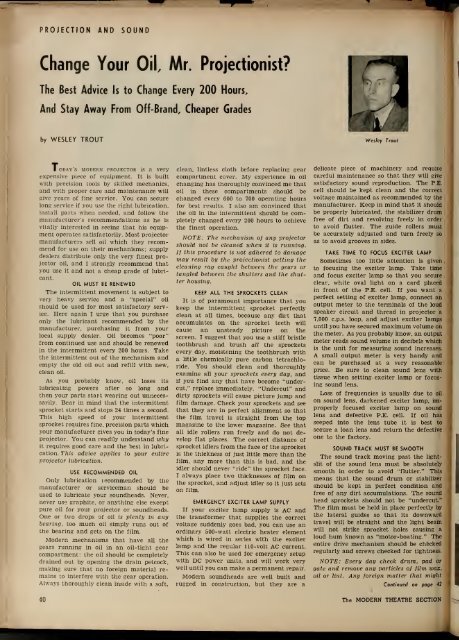Boxoffice-May.03.1952
Create successful ePaper yourself
Turn your PDF publications into a flip-book with our unique Google optimized e-Paper software.
j<br />
j<br />
PROJECTION AND SOUND<br />
Change Your Oil Mr.<br />
Projectionist?<br />
The Best Advice Is to Change Every 200 Hours,<br />
And Stay Away From Off-Brand, Cheaper Grades<br />
by WESLEY TROUT Wesley Trout<br />
I ODAY S MODERN PROJECTOR IS a Very<br />
expensive piece of equipment. It is built<br />
with precision tools by skilled mechanics,<br />
and with proper care and maintenance will<br />
give years of fine service. You can secure<br />
long service if you use the right lubrication,<br />
install parts when needed, and follow the<br />
manufacturer's recommendations as he is<br />
vitally interested in seeing that his equipment<br />
operates satisfactorily. Most projector<br />
manufacturers sell oil which they recommend<br />
for use on their mechanisms; supply<br />
dealers distribute only the very finest projector<br />
oil. and I strongly recommend that<br />
you use it and not a cheap grade of lubricant.<br />
OIL MUST BE RENEWED<br />
The intermittent movement is subject to<br />
very heavy service and a "special" oil<br />
should be used for most satisfactory service.<br />
Here again I urge that you purchase<br />
only the lubricant recommended by the<br />
manufacturer, purchasing it from your<br />
local supply dealer. Oil becomes "poor"<br />
from continued use and should be renewed<br />
in the intermittent every 200 hours. Take<br />
the intermittent out of the mechanism and<br />
empty the old oil out and refill with new,<br />
clean oil.<br />
As you probably know, oil loses its<br />
lubricating powers after so long and<br />
then your parts start wearing out unnecessarily.<br />
Bear in mind that the intermittent<br />
sprocket starts and stops 24 times a second.<br />
This high speed of your intermittent<br />
sprocket requires fine, precision parts which<br />
your manufacturer gives you in today's fine<br />
projector. You can readily understand why<br />
it requires good care and the tmst in lubrication.<br />
This advice applies to your entire<br />
projector lubrication.<br />
USE<br />
RECOMMENDED OIL<br />
Only lubrication lecommended by the<br />
manufacturer or serviceman should be<br />
used to lubricate your soundheads. Never,<br />
never use graphite, or anything else except<br />
pure oil for your projector or soundheads.<br />
One or two drops of oil is plenty in any<br />
bearing, too much oil simply runs out of<br />
the bearing and gets on the film.<br />
Modern mechanisms that have all the<br />
gears running in oil in an oil-tight gear<br />
compartment: the oil should be completely<br />
drained out by opening the drain petcock,<br />
making sure that no foreign material remains<br />
to interfere with the gear operation.<br />
Always thoroughly clean inside with a soft,<br />
clean, lintless cloth before replacing gear<br />
compartment cover. My experience in oil<br />
changing has thoroughly convinced me that<br />
oil in these compartments should be<br />
changed every 600 to 700 operating hours<br />
for best results. I al.so am convinced that<br />
the oil in the intermittent should be completely<br />
changed every 200 hours to achieve<br />
the finest operation.<br />
NOTE: The mechanism of any projector<br />
should not be cleaned when, it is running.<br />
If this procedure is not adhered to damage<br />
may result by the projectionist getting the<br />
cleaning rag caught between the gears or<br />
tangled betioeen the shutters and the shutter<br />
housing.<br />
KEEP<br />
ALL THE SPROCKETS CLEAN<br />
It is of paramount importance that you<br />
keep the intermittent sprocket perfectly<br />
clean at all times, because any dirt that<br />
accumulates on the sprocket teeth will<br />
cause an unsteady picture on the<br />
screen. I suggest that you use a stiff bristle<br />
toothbrush and brush all the sprockets<br />
every day, moistening the toothbrush with<br />
a little chemically pure carbon tetrachloride.<br />
You should clean and thoroughly<br />
examine all your sprockets every day, and<br />
if you find any that have become "undercut,"<br />
replace immediately. "Undercut" and<br />
dirty sprockets will cause picture jump and<br />
film damage. Check your sprockets and see<br />
that they are in perfect alignment so that<br />
the film travel is straight from the top<br />
magazine to the lower magazine. See that<br />
all idle rollers run freely and do not develop<br />
flat places. The correct distance of<br />
sprocket idlers from the face of the sprocket<br />
is the thickness of just little more than the<br />
film, any more than this is bad, and the<br />
idler should never "ride" the sprocket face.<br />
I always place two thicknesses of film on<br />
the sprocket, and adjust idler so it just sets<br />
on film.<br />
EMERGENCY EXCITER LAMP SUPPLY<br />
If your exciter lamp supply is AC and<br />
the transformer that supplies the correct<br />
voltage suddenly goes bad, you can use an<br />
ordinary 500-watt electric heater element<br />
which is wired in series with the exciter<br />
lamp and the regular 110-volt AC current.<br />
This can also be used for emergency setup<br />
with DC power units, and will work very<br />
well until you can make a permanent repair.<br />
Modern soundheads are well built and<br />
rugged in construction, but they are a<br />
delicate piece of machinery and require<br />
careful maintenance so that they will give<br />
\<br />
satisfactory sound reproduction. The P.E,<br />
I<br />
cell should be kept clean and the correct<br />
voltage maintained as recommended by the<br />
manufacturer. Keep in mind that it should<br />
be properly lubricated, the stabilizer drum i<br />
free of dirt and revolving freely in order<br />
to avoid flutter. The guide rollers i<br />
must<br />
be accurately adjusted and turn freely so<br />
j<br />
as to avoid grooves in sides.<br />
TAKE TIME TO FOCUS EXCITER LAMP<br />
Sometimes too little attention is given<br />
\<br />
to focusing the exciter lamp. Take time i<br />
and focus exciter lamp so that you secure<br />
i<br />
clear, white oval light on a card placed<br />
in front of the P.E. cell. If you want a<br />
perfect setting of exciter lamp, connect an i<br />
output meter to the terminals of the loud<br />
speaker circuit and thread in projector a<br />
7,000 c.p.s. loop, and adjust exciter lamps !<br />
until you have secured maximum volume on<br />
the meter. As you probably know, an output<br />
\<br />
;<br />
meter reads sound volume in decibels which<br />
is the unit for measuring sound increases.<br />
A small output meter is very handy and :<br />
•<br />
can be purchased at a very reasonable<br />
price. Be sure to clean sound lens with<br />
tissue when setting exciter lamp or focusing<br />
sound lens.<br />
Loss of frequencies is usually due to oil<br />
on sound lens, darkened exciter lamp, im-<br />
1<br />
properly focused exciter lamp on sound<br />
lens and defective P.E. cell. If oil has<br />
seeped into the lens tube it is best to<br />
secure a loan lens and return the defective<br />
one to the factory.<br />
SOUND TRACK MUST BE SMOOTH<br />
The sound track moving past the lightslit<br />
of the sound lens must be absolutely<br />
smooth in order to avoid "flutter." This<br />
means that the sound drum or stabilizer<br />
should be kept in perfect condition and<br />
free of any dirt accumulations. The sound<br />
head sprockets should not be "undercut,"<br />
The film must be held in place perfectly by<br />
the lateral guides so that its downward<br />
travel will be straight and the light beam<br />
will not strike sprocket holes causing a<br />
loud hum known as "motor-boating." The<br />
entire drive mechanism should be chfecked<br />
regularly and screws checked for tightness.<br />
NOTE: Every day check drum, pad or<br />
gate and remove any particles of film wax,<br />
oil or lint. Any foreign matter that might<br />
Continued on page 42<br />
40 The MODERN THEATRE SECTION

















